Bonaventure Soh Bejeng Ndikung
Bonaventure Soh Bejeng Ndikung

I Will Draw a Map of What You Never See – Endeavours in Rhythmanalysis
Bonaventure Soh Bejeng Ndikung, Saskia Köbschall and 2 more
A multidisciplinary investigation of the interrelations of space and time, memory, architecture and urban planning through and beyond Henri Lefebvre's concept of Rhythmanalysis.
“The whole universe revolves around rhythm, and when we get out of rhythm, that's when we get into trouble.”—Babatunde Olatunji
A gathering of the echoes, memories and findings after three years of research, performances, exhibitions and conversations within “That, Around Which The Universe Revolves. On Rhythmanalysis of Memory, Times, Bodies in Space”. With chapters in Lagos, Düsseldorf, Harare, Hamburg and Berlin, the S A V V Y Contemporary project and publication bring together visual artists, urbanists, writers, photographers, performers, poets, and theorists to investigate the interrelations of space and time, memory, architecture and urban planning through and beyond Henri Lefebvre's concept of Rhythmanalysis.
Published following the exhibition project “That, Around Which The Universe Revolves. On Rhythmanalysis of Memory, Times, Bodies in Space”, SAVVY Contemporary, Berlin, from December 1st, 2017, to January 28, 2018.
Edited by Elena Agudio, Anna Jäger, Saskia Köbschall, Bonaventure Soh Bejeng Ndikung.
Contributions by Akinbode Akinbiyi, Jacques Coursil, Thulile Gamezde, Gintersdorfer/Klaßen, Noa Ha, Hebbel am Ufer Berlin (Annemie Vanackere & Ricardo Carmona), Kampnagel Hamburg (Caroline Spellenberg), Jan Lemitz, Dorothee Munyaneza, Lucia Nhamo, Christian Nyampeta, Qudus Onikeku, Tracey Rose, Louis Henri Seukwa, AbdouMaliq Simone, Awilda Sterling, Greg Tate, Kathrin Tiedemann, Trinh T. Minh-ha, Tinofireyi Zhou, Percy Zvomuya.

Maa Ka Maaya Ka Ca A Yere Kono – 13th Edition of the Rencontres de Bamako - African Biennale of Photography
Bonaventure Soh Bejeng Ndikung
The catalogue of the 13th edition of the Rencontres de Bamako - African Biennale of Photography, focusing on multiplicity, difference, becoming, and heritage.
The dominant narrative in this "globalized world" is, incidentally, that of singularity—of universalism, of single identities, of singular cultures, of insular political systems. With this narrative, however, comes an illusory sense of stability and stasis; identities seem inalterable, cultures are immutable, political systems prove uneasy in the face of change. Thus, in sustaining this pervasive discourse, there has been a great loss of multiplicity, of fragmentation, of process and change, and not least of complex notions of humanity and equally complex narratives.
In decentering this year's biennale On Multiplicity, Difference, Becoming, and Heritage, General Director Cheick Diallo, Artistic Director Bonaventure Soh Bejeng Ndikung, and the curatorial team—Akinbode Akinbiyi (artist and independent curator), Meriem Berrada (Artistic Director, MACAAL, Marrakech), Tandazani Dhlakama (Assistant Curator, Zeitz MOCAA, Cape Town, South Africa), and Liz Ikiriko (artist and Assistant Curator, Art Gallery of York University, Toronto)—of the Bamako Encounters pay a powerful tribute to the spaces in between, to that which defies definition, to phases of transition, to being this and that or neither and both, to becoming, and to difference and divergence in all their shades. Accordingly, Amadou Hampâté Bâ's statement (Aspects de la civilisation africaine, Éditions Présence Africaine, 1972) presiding over the manifestation, Maa ka Maaya ka ca a yere kono,translates to, "the persons of the person are multiple in the person."
A key tool for negotiating the processual and shifting nature of multiplicity lies in storytelling. It is the central medium through which humanity points the lens on itself and launches an attempt at self-understanding and reflection, and the breadth of answers given throughout history testifies to the congenial nature of storytelling and multiplicity. Moreover, the stories we tell not only negotiate who we are but also expose underlying currents of who we will become in the future. This is the concern lying at the heart of the 13th edition of the Bamako Encounters—the stories we tell, the multiple facets of humanity we accommodate, notions of processuality, becoming in being, embracing identities that are layered, fragmented, and divergent, and the multifarious ways of being in the world, whether enacted or imagined. It should be emphasized that this does not apply only to questions of personal identity. On the contrary, it is a bold affirmation of transformation and transition, of becoming in an emphatic sense, and is thus equally significant for state politics. It also rings true for questions of heritage/patrimony. Embracing the kaleidoscopic legacy of our multiple heritages means to open them up and liberate the term "patrimony" from its etymological roots (the Latin patrimonium means "the heritage of the father"), imagining in its place an inclusive concept of matrimony.
Thus, in this 13th edition of the Bamako Encounters with the title Maa ka Maaya ka ca a yere kono, artists, curators, scholars, activists, and people of all walks of life are invited to reflect collectively on these multiplicities of being and differences, on expanding beyond the notion of a single being, and on embracing compound, layered and fragmented identities as much as layered, complex, non-linear understandings of space(s) and time(s).
Published following the 13th edition of the Rencontres de Bamako - African Biennale of Photography, in Bamako, Mali, in 2022.
With Saïd Afifi, Ixmucané Aguilar, Baff Akoto, Annie-Marie Akussah, Américo Hunguana, Daoud Aoulad-Syad, Leo Asemota, Myriam Omar Awadi, Salih Basheer, Shiraz Bayjoo, Amina Benbouchta, Hakim Benchekroun, Maria Magdalena Campos Pons, Rehema Chachage, Ulier Costa-Santos, Adama Delphine Fawundu, Fatoumata Diabaté, Aicha Diallo, Amsatou Diallo, Anna Binta Diallo, Mélissa Oummou Diallo, Nene Aïssatou Diallo, Binta Diaw, Adji Dieye, Imane Djamil, Sènami Donoumassou, Abdessamad El Montassir, Fairouz El Tom, Luvuyo Equiano Nyawose, Raisa Galofre, Raisa Galofre, Joy Gregory, Gherdai Hassell, Thembinkosi Hlatshwayo, Letitia Huckaby, Anique Jordan, Gladys Kalechini, Hamedine Kane, Atiyyah Khan, Gulshan Khan, Seif Kousmate, Mohammed Laouli, Maya Louhichi, Mallory Lowe Mpoka, Nourhan Maayouf, Marie-Claire Messouma Manlanbien, Botembe Moseka Maïté, Louisa Marajo, Clarita Maria, Billie McTernan, Mónica de Miranda, Arsène Mpiana Monkwe, Sethembile Msezane, Ebti Nabag, Elijah Ndoumbe, Lucia Nhamo, Samuel Nja Kwa, Nyancho NwaNri, Jo Ractcliffe, Adee Roberson, Fethi Sahraoui, Muhammad Salah, Neville Starling, Eve Tagny, René Tavares, Sackitey Tesa, Helena Uambembe, David Uzochukwu, Sofia Yala, Timothy Yanick Hunter.

Pidginization as Curatorial Method – Messing with Languages and Praxes of Curating
Bonaventure Soh Bejeng Ndikung
In this compelling rethinking of curatorial practice, renowned museum director, curator, and writer Bonaventure Soh Bejeng Ndikung proposes that Pidgin languages and pidginization as a mode of being and doing offer a decolonialized reinvention of communicative practices—a space in which the boundaries between disciplines of knowledge collapse and sociopolitical, economic, ethical, and spiritual concepts and questions are renegotiated.
Written as a series of powerful anecdotes, the book grounds its provocative ideas in personal, cultural, and political histories of challenge and improvisation, and argues, as Ndikung writes, that "pidginized curating is a curating that combines works, ideas, practices, and languages in resistance to canonical conventions, cultural stasis, ossified practices, dead rhythms, and singular forms."
Bonaventure Soh Bejeng Ndikung (born 1977 in Yaoundé, Cameroon, lives and works in Berlin) is an independent art curator, art critic, author and biotechnologist. He is founder and artistic director of SAVVY Contemporary Berlin and editor-in-chief of SAVVY Journal for critical texts on contemporary African art. He was associate professor at Muthesius University Kiel, and is currently guest professor in curatorial studies at the Städelschule in Frankfurt. He was curator-at-large for documenta 14, and was a guest curator of the 2018 Dak'Art Biennale in Senegal. As part of the Miracle Workers Collective, he curated the Finnish Pavilion at the Venice Biennale in 2019.
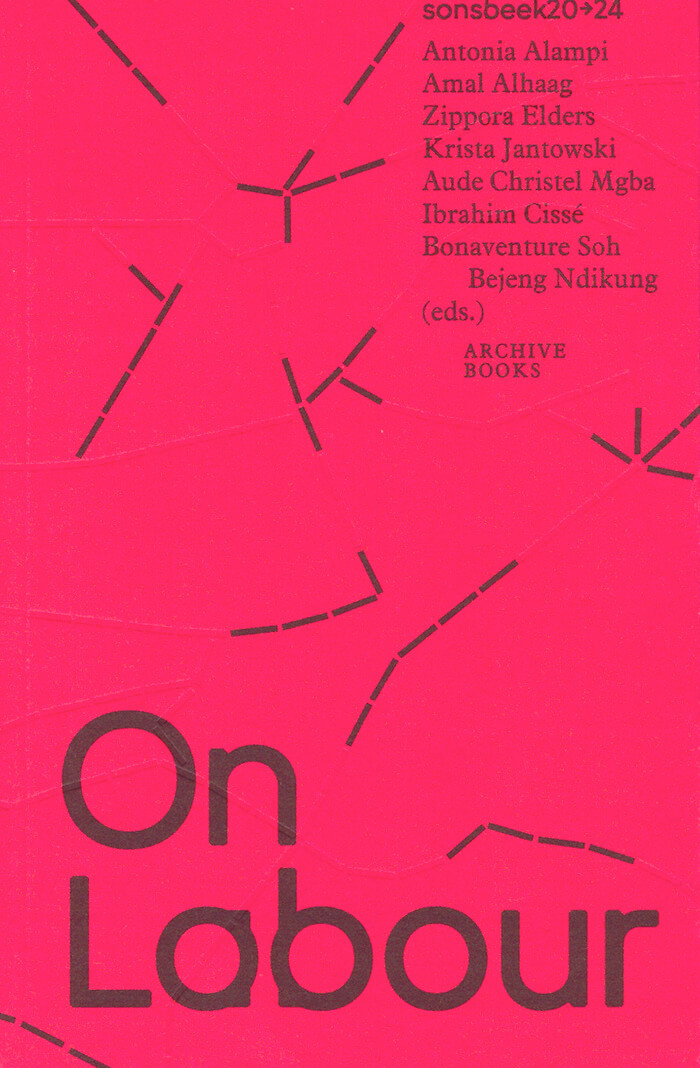
Sonsbeck20→24 – Force Times Distance – On Labour (reader)
Ibrahim Cissé, Bonaventure Soh Bejeng Ndikung
This reader is a culmination of direct and tangential deliberations on notions of labour, appreciated across geographies and mediums. Newly commissioned textual manifestations in a multilogue with historical positions.
The reader could be perceived as a negotiation of positions, as the strive towards utterances, towards becoming. Each text could be imagined as a stanza in a song. This is also a strive towards musicality. Or at least a wish for this reader to be a choir, in which we collectively sing, in which we all listen to each other to be able to sing, but most importantly, in which we afford ourselves the privilege of 'hearing the eloquence of silence', 'seeing the inner vision beneath the closed eyes' and 'listening to the chastity of inner music that defies betrayal by the wayward wind.'
Edited by Bonaventure Soh Bejeng Ndikung and Ibrahim Cissé with Antonia Alampi, Amal Alhaag, Zippora Elders, Krista Jantowski, Aude Christel Mgba.
Contributions by Bonaventure Soh Bejeng Ndikung, Panashe Chigumadzi, Maurizio Lazzarato, Danielle Child, Anne Moraa, Philomena Essed, Djuwa Mroivili, Anivia Beylard, Jana Keijdener, Iheb Guermazi, Alia Mossallam, Ruth Wilson Gilmore, Chenjerai Kumanyika, Simone Atangana Bekono, Lionel Manga, Kodwo Eshun, Amal Alhaag, Precious Colette Kemigisha, Guy Ossito Midiohouan, Akila Richards, Mwazulu Diyabanza, Ibrahim Cissé, Léon-Gontran Damas
Graphic design: Leon Lukas Plum / Werkplaats Typografie.
Published in August 2021
Bilingual edition (English / Dutch)
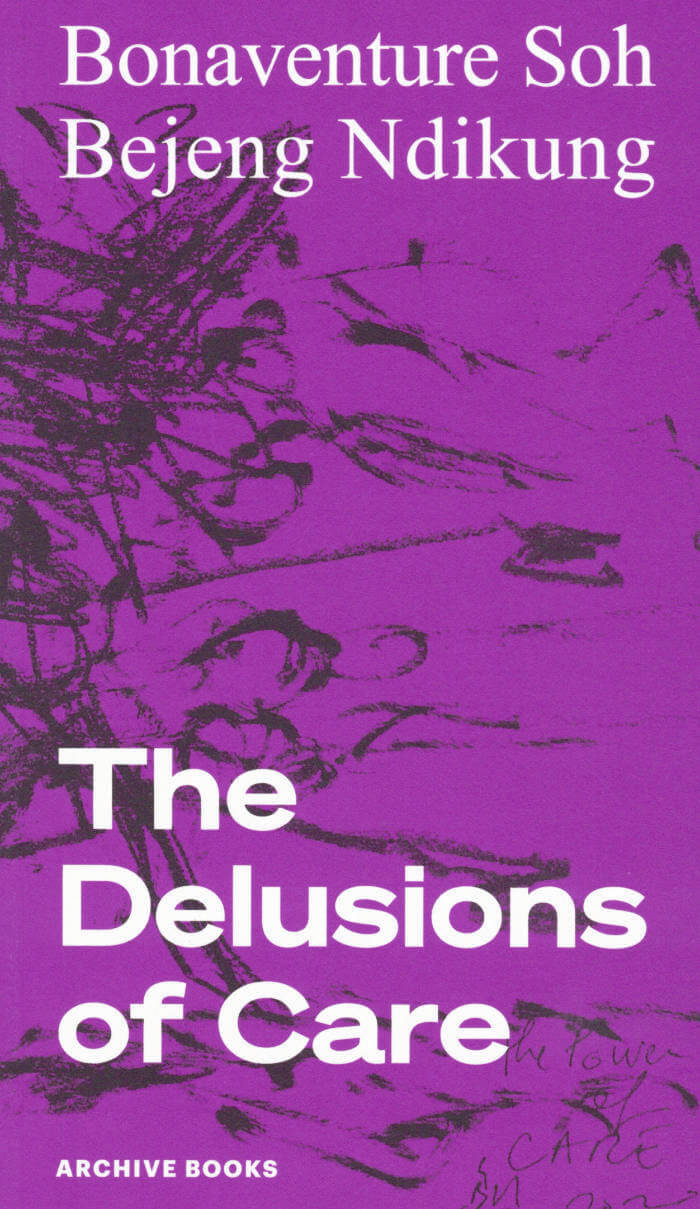
The Delusions of Care
Bonaventure Soh Bejeng Ndikung
The Delusions of Care is a culmination of three long essays that ruminate on notions of care in our contemporary and historically. It is concerned with the appropriation of care by the capitalist establishment as much as supremacists of all kinds. What can we consider as care and who gives care for what reasons. Stuck in the cup de sac of a pandemic that has brought most of the world to its knees, these questions seem of some pertinence. The reflections in this book spanning a critique of care from the regimes of birth control through police brutality to the storming of the Reichstag in the summer of 2020, that very much set precedence to the storming of the Capitol Hill by Trumpists and White supremacists. The book does not only point out the pitfalls of a corrupted notion of care, but tries to offer paths for rehabilitation, restoration, restitution through a non-selfish spirit of care.
This book is a manifesto in which love and crisis imbue each other with the spirit of care. Bonaventure Ndikung calls on those in its belly to seize the means of the production of caring from the beast of state power and corporate greed. —Arjun Appadurai
Bonaventure Soh Bejeng Ndikung (born 1977 in Yaoundé, Cameroon, lives and works in Berlin) is an independent art curator, art critic, author and biotechnologist. He is founder and artistic director of SAVVY Contemporary Berlin and editor-in-chief of SAVVY Journal for critical texts on contemporary African art.

Whose Land Have I Lit on Now? – Contemplations on the Notions of Hospitality
Elena Agudio, Bonaventure Soh Bejeng Ndikung and 1 more
A curatorial project about concepts of hospitality and the triggers of hostility in hospitality.
The unlikely seemed possible in the summer of 2015, as thousands of immigrants from mostly Syria made their way to Germany and Angela Merkel made the statement "Wir schaffen das" (We can do it/ we can cope with it). A German's venture into open hospitality was being witnessed as the country celebrated its newfound "Willkommenskultur." Soon enough, however, the summer of grace became the autumn of rage and the winter of nightmares, as the initial goodwill turned into the resurgence of the extreme right in Germany. Much is happen- ing today that calls for a reflection on hospitality in Germany, in Europe, and in the world at large. Taking as a point of departure Derrida's notion of "hostipitality" – that is the presence of hostility in all hospitality and hosting–this anthology brings together original contributions from artists, scholars, activists, poets, curators, and musicians who reflect on different experi- ences and notions of hospitality.
In an age of flourishing resentments and antipathy towards all that seems conceptually or physically "strange"/ a "stranger," in a time when the historical violence of the guest (as a colonizer) over the host is reiterated and fortified; in an era that has turned hospitality into a neoliberal commodity, it becomes urgent to reconsider hospitality's gradients of power.
Contributions by Elena Agudio,Mohamed Amjahid, Ulf Aminde, Arjun Appadurai, Federica Bueti, Ibrahim Arslan, Joshua Chambers-letson, Bilgin Ayata, Jill Denton, Jihan El-tahri, Denise Ferreira Da Silva, Seloua Luste Boulbina, Raisa Galofre, Lionel Manga, Peter Morin, Massimo Perinelli, Naeem Mohaiemen, Miriam Schickler, Farkhondeh Shahroudi, Safiya Sinclair, Bonaventure Soh Bejeng Ndikung, Denise Ryner, Margarita Tsomou, Tania Willard.
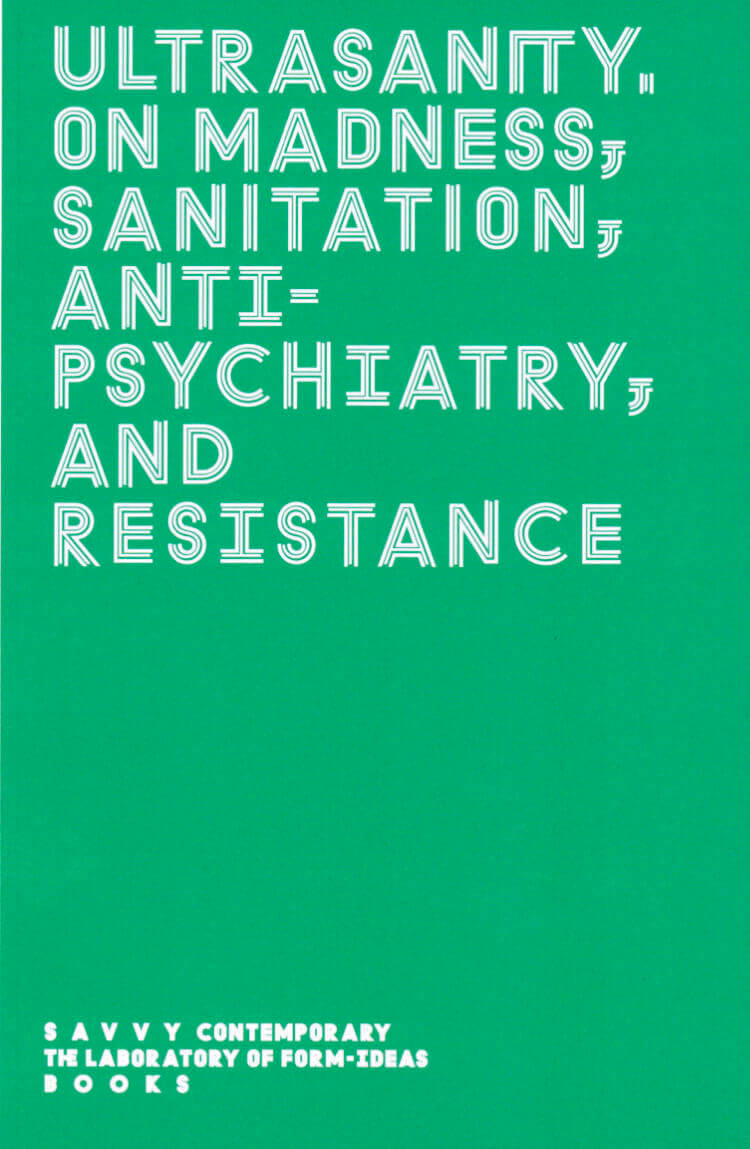
Ultrasanity – On Madness, Sanitation, Antipsychiatry, and Resistance
Kelly Krugman, Elena Agudio and 1 more
A curatorial and research project that aims to move beyond insanity as the opposite of sanity, and imagine a space beyond what is understood as sane, i.e. ultrasanity—not a romanticization of madness or mental illness, but an effort to reconsider and challenge the notion of madness and the stigmas labelled on the so-called mad.
This publication unfolds as a collection of words, works, and images that informed, incited, and embodied SAVVY Contemporary's project Ultrasanity. On Madness, Sanitation, Antipsychiatry, and Resistance, an exhibition and research project on the elasticity of sanity.
It doesn't materialise simply as a catalogue of the exhibition but as a book retracing the trajectory of a research, as an occasion to extend SAVVY's curatorial proposition into a further choral perspective. With it we aim to deepen some of the reflections that moved and agitated us through two years of researches, conversations, programming, and practicing of Ultrasanity. The cogitations and the confrontations, the movements and the sounds, the trials and the tribulations, that accompanied us through the project and its 4 chapters and iterations are here collected to resonate one to each other, and to open new trajectories and paths.
Contributions by Hortensia Völckers, Kirsten Ha, Alya Sebti, Inka Gressel, Joerg Fingerhut, Ana Gómez-Carillo, Bonaventure Soh Bejeng Ndikung, Elena Agudio, Frederick W. Hickling, Debbie-Ann Chambers, Jaswant Guzder, The Brother Moves On, Jota Mombaça, Ghayath Almadhoun, Dora García, Monica Greco, Sajdeep Soomal, Ayesha Hameed, Jaswant Guzder, Johan Lagae, Sofie Boonen, Maarten Liefooghe, Mpho Matsipa, Dorothee Munyaneza.
And more

GLEAN 9 - Autumn 2025
Art is slow attention.
With Contributions from: Rosana Paulino, City Report São Paulo, Bonaventure Soh Bejeng Ndikung, Bruno Baptistelli, Françoise Schein, Anna Maria Maiolino, Rubem Valentim, Els Opsomer, Elen Braga, Julien Creuzet and Lieven De Boeck.
Guest Editor: Jota Mombaça
GLEAN is a Brussels-based magazine for contemporary art with quarterly publications in both English and Dutch.

Not Going it Alone: Collective Curatorial Curating
In recent years, collective approaches to curatorial practice have become prominent, and not for the first time. While the myth of the stand-alone curator has been largely dismantled in favor of recognizing the myriad other actors and agencies—from artists to installers, from gallery attendants to directors, and others—who make their work possible, contemporary curatorial practices encompass far more than bringing simply more collaborators together. Through a collection of essays and experimental texts, Not Going it Alone: Collective Curatorial Curating offers readers a layered and contextual understanding of this phenomenon, its debates, and possibilities across a range of temporalities, positions, and geographical perspectives.
Edited by Paul O'Neill with Gerrie van Noord / Elizabeth Larison
With contributions from:
Maria Berríos / Pip Day / Sofía Olasooaga
Nikolett Erőss / Eszter Lázár
Index and PRAKSIS Teen Advisory Boards
Elizabeth Larison
Nina Möntmann
Bonaventure Soh Bejeng Ndikung
Gerrie van Noord
Paul O‘Neill
Agnieszka Pindera
Serubiri Moses
Gregory Sholette

Forgive Us Our Trespasses
The Forgive Us Our Trespasses Reader explores radical and emancipatory significations and fabulations of trespassing, turning towards practices that transgress and reshape the boundaries of, among other dimensions, currency, governance, religion, spirituality, language, and artificial intelligence.
Complementing the thematic concerns of the exhibition of the same name, this collection of essays, poems, artistic contributions, and a sermon, conceptually maps the distance between the English word "trespasses"—with its double meaning of to sin or to physically tread—and the German word "Schuld"—referring to sin and guilt but with etymological proximities to debt (Schulden). Deviating from the line of prayer that lends the project its name, the contributors do not ask for forgiveness for the various trespasses they elucidate—be they religious, social, class-related, national, sexual, or disciplinary in nature—but rather assert them as modes of transgression, as forms of rebellion, and as possibilities for transcendence.
Published on the occasion of the eponymous exhibition at Haus der Kulturen der Welt, Berlin, in 2024.
Contributions by Victoria Adukwei Bulley, Egidija Čiricaitė, Yásnaya Elena Aguilar Gil, Toussaint M. Kafarhire, Mansour Ciss Kanakassy, Chao Tayiana Maina, Bonaventure Soh Bejeng Ndikung, Tavia Nyong’o, Mary Louise Pratt, Josefine Rauch, Deborah A. Thomas, Senthuran Varatharajah, Yuanwen Zhong.

Decolonizing Art Book Fairs – Pratiques de l'édition indépendante dans les Sud(s)
Parfait Tabapsi, Michalis Pichler and 3 more
A manifesto for the decolonization of art book fairs and publishing.
Can we decolonize art book fairs? Can we decentralize knowledge and deconstruct privilege in our contexts? Decolonizing Art Book Fairs aims to rethink through the existing and speculative frameworks of organizational practice in the art book fairs. This workbook attempts to introduce new narratives and help deconstruct the frontiers between north(s) and south(s), putting an emphasis on practitioners and initiatives from the African continent and diaspora. A workbook with (primarily newly commissioned) texts and interviews.
Contributions by Jean-Claude Awono, Yaiza Camps, Chayet Chiénin, Chimurenga, Renata Felinto, Wanjeri Gakuru, Moritz Grünke, Aryan Kaganof, Sharlene Khan, Grada Kilomba, Carla Lever, Fouad Asfour, Dzekashu MacViban, Gladys Mendía, James Murua, Tinashe Mushakavanhu, Simon Njami, Bonaventure Soh Bejeng Ndikung, Monica Nkodo, O Menelick 2Ato, Pascale Obolo, Michalis Pichler, Mario Pissarra, Sergio Raimundo, Djimeli Raoul, Flurina Rothenberger, Bienvenu Sene, Bisi Silva, Kwanele Sosibo, Parfait Tabapsi, Louise Umutoni, Zamân Books & Curating.
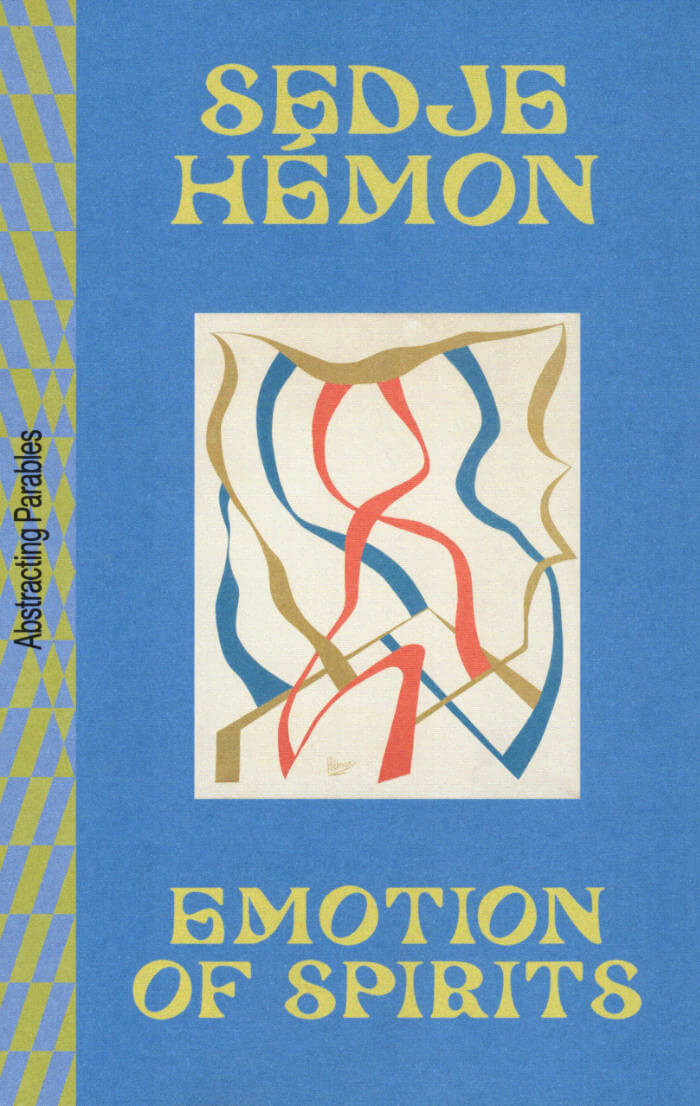
Emotion of Spirits
A panorama of the multifaceted and transversal production of Sedje Hémon, with fifteen essays.
Published on the occasion of the exhibition "Sedje Hémon. Imran Mir. Abdias Nascimento. Abstracting Parables", as part of the international Arnhem based art manifestation sonsbeek20→24, at Stedelijk Museum, Amsterdam, in 2022.
Dutch-Jewish painter and composer Sedje Hémon's (born Sedje Frank, 1923-2011) artistic practice was a deep deliberation on natural sciences, as well as an exploration of other ways of knowing. Her work was strongly influenced by her lived experience as a Shoah survivor and a member of the resistance movement. Educated as a violinist, incarceration during WWII left Hémon physically unable to play, upon which she turned her attention to painting—without ever abandoning music. During the 1950s and 1960s, she developed an intricate method for translating her paintings into musical scores. Hémon described her paintings as musical compositions, and their abstract forms are to be read as such—in relation to musical parameters such as duration, pitch, and timbre. Her visual works can actually be performed musically according to the system that she herself developed. Defiantly, Hémon worked to show the common origin and intersectionality of all arts and sciences, culminating in the development of a theory for the "integration of the arts."
Edited by Amal Alhaag, Aude Christel Mgba, Bonaventure Soh Bejeng Ndikung, Gwen Parry, Ibrahim Cissé, Krista Jantowski, Zippora Elders.
Contributions by Amal Alhaag, Bonaventure Soh Bejeng Ndikung, Ibrahim Cissé, Sophie Douala, Zippora Elders, Krista Jantowski, Aude Christel Mgba, Gwen Parry, Peter Jasper Wapperom, Elmyra van Dooren, Cannach MacBride, Siji Jabbar, Claire van Els, Marianna Maruyama, Maurice Rummens, Romy Rüegger, Jake Schneider.
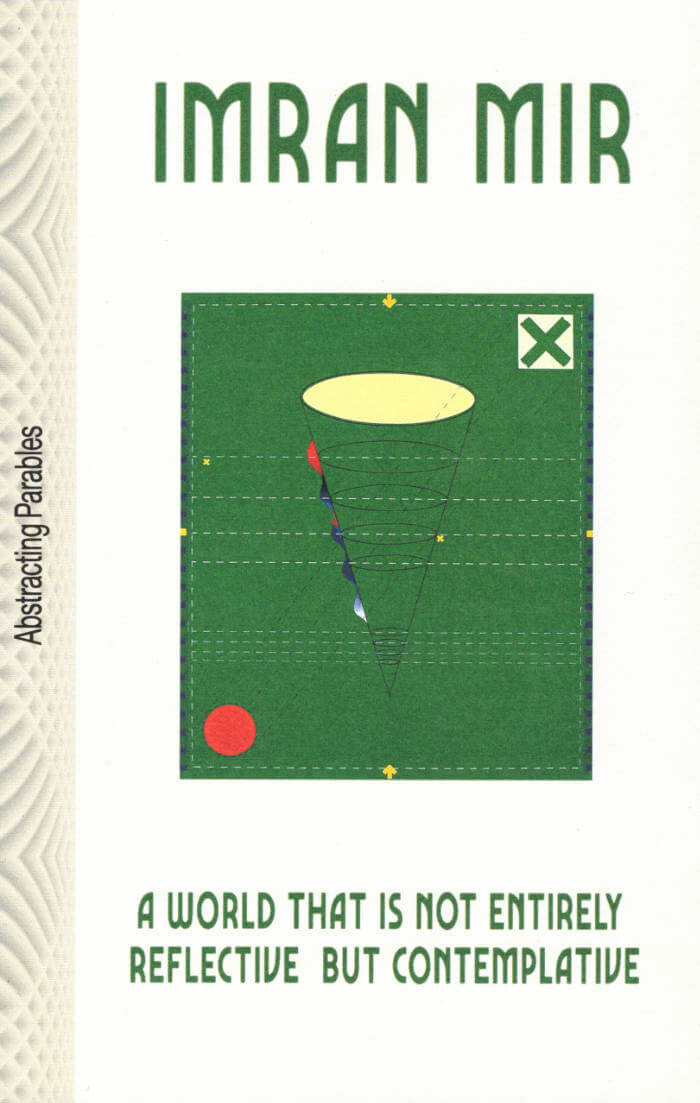
A World that is not entirely Reflective but Contemplative
A survey of Imran Mir's abstract and contemplative work, with fifteen essays.
Published on the occasion of the exhibition "Sedje Hémon. Imran Mir. Abdias Nascimento. Abstracting Parables", as part of the international Arnhem based art manifestation sonsbeek20→24, at Stedelijk Museum, Amsterdam, in 2022.
Pakistani artist, sculptor, and designer Imran Mir's (1950-2014) oeuvre can be interpreted as a constant refusal to provide comprehensive elaboration beyond what one experiences. The act of contemplation is a guiding principle to interpreting Imran Mir's work, an approach that reverberates into a practice that grew out of conversations with a community of artists, activists, poets, relatives, and other thinkers in Karachi.
Non-figurative, non-representational, geometrical and very bold, Imran Mir's works can be read as theorems and positions on multiple modernisms and abstractions. Without being a critique or a response, he played with the rules, bypassing and expanding them to other realms to explore ways of being, ways of knowing time and space outside of the confinements of the West.
Edited by Amal Alhaag, Aude Christel Mgba, Bonaventure Soh Bejeng Ndikung, Gwen Parry, Ibrahim Cissé, Krista Jantowski, Zippora Elders.
Contributions by Amal Alhaag, Bonaventure Soh Bejeng Ndikung, Ibrahim Cissé, Sophie Douala, Zippora Elders, Natasha Ginwala, Hajra Haider Karrar, Krista Jantowski, Momtaza Mehri, Aude Christel Mgba, Nighat Mir, Quddus Mirza, Gwen Parry, Nafisa Rizvi.
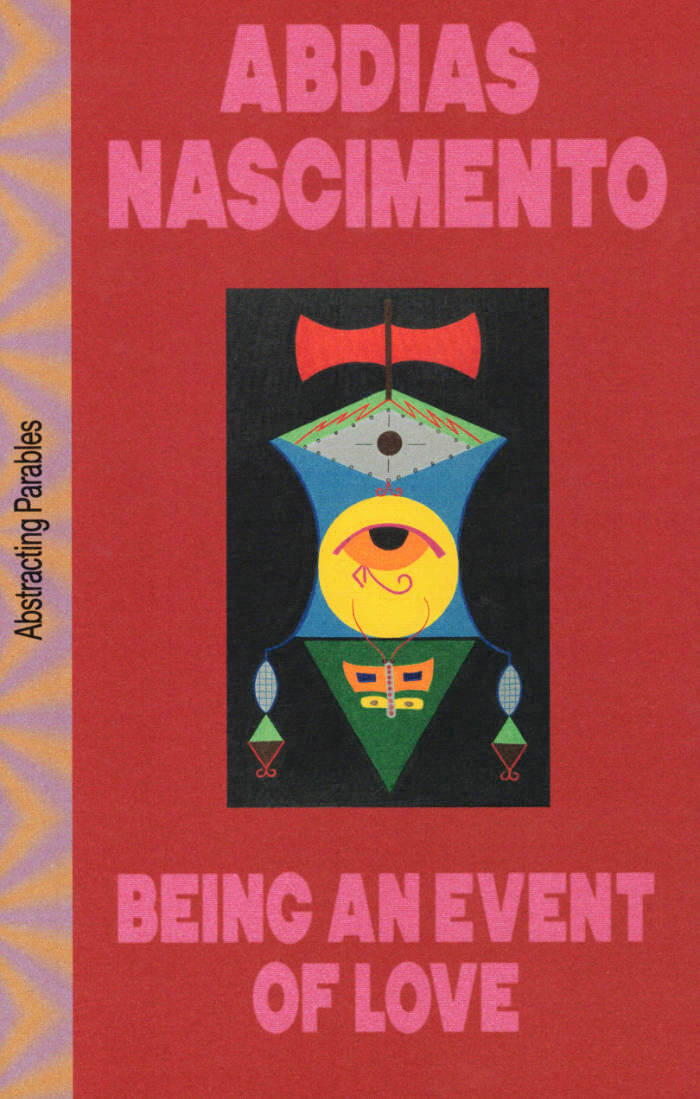
Being An Event of Love
A survey of the pictorial work of the Afro-Brazilian artist, writer and activist, with fifteen essays.
Published on the occasion of the exhibition "Sedje Hémon. Imran Mir. Abdias Nascimento. Abstracting Parables", as part of the international Arnhem based art manifestation sonsbeek20→24, at Stedelijk Museum, Amsterdam, in 2022.
The life and work of Afro-Brazilian painter, poet, essayist, dramatist, activist, and member of Parliament Abdias Nascimento (1914-2011) is a testament to his active commitment to Black expression and solidarity, both artistically and politically. Above all, Nascimento was a Pan-African activist. He organized the National Convention of Brazilian Blacks (1946) and the 1st Congress of Brazilian Blacks four years later. During the same period, he founded the Black Experimental Theater (1944) and the Black Arts Museum project (1950), both in Rio de Janeiro. While curating the latter, he began to develop his own creative work.
Edited by Amal Alhaag, Aude Christel Mgba, Bonaventure Soh Bejeng Ndikung, Gwen Parry, Ibrahim Cissé, Krista Jantowski, Zippora Elders.
Contributions by Abdias Nascimento, Bonaventure Soh Bejeng Ndikung, Shade Mary-Ann Olaoye, Amal Alhaag, Ibrahim Cissé, Sita Dickson Littlewood, Sophie Douala, Zippora Elders, Lélia González, Keyna Eleison, Krista Jantowski, Elisa Larkin Nascimento, Aude Christel Mgba, Goia Mujalli, Kabengele Munanga, Gwen Parry, Olabiyi Yai.
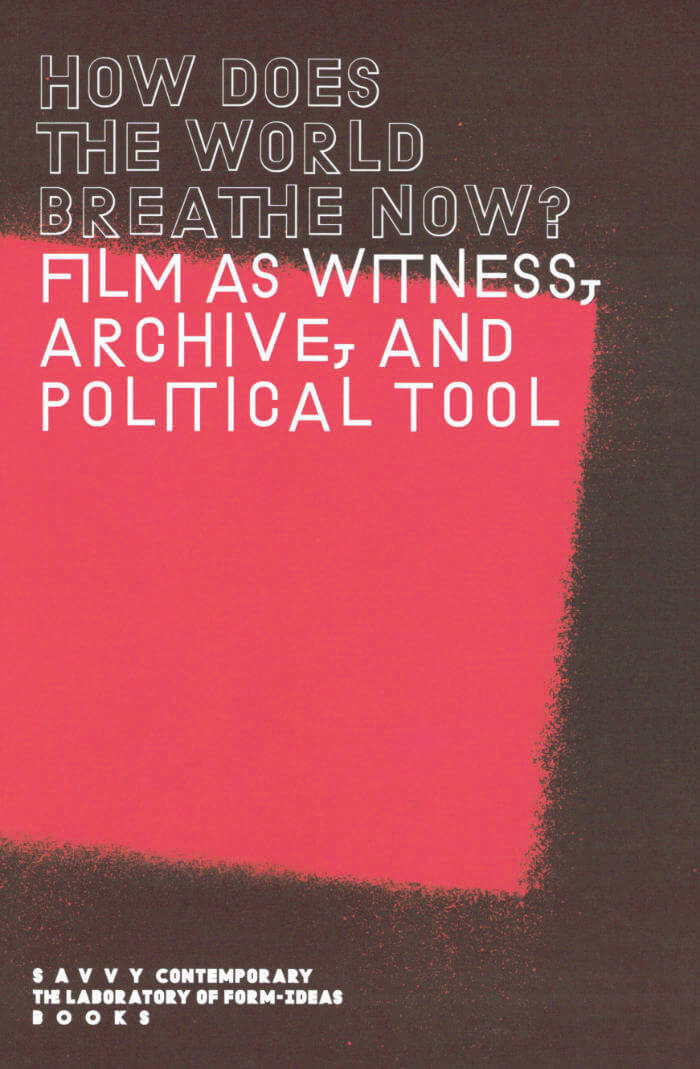
How Does The World Breathe Now? – Film as Witness, Archive, and Political Tool
Eirini Fountedaki, Pia Chakraverti-Würthwein
How film may be a constructive tool to examine the state of the world and its cruelties, and how to form a more stable and supportive culture of film production and distribution.
Out of frustration and exasperation with the state of the world in 1960, Indonesian poet Willibrordus Surendra Broto Rendra asked himself: "How does the world breathe now?"
The film series conceived of by SAVVY Contemporary, which ran from September 2016 through March 2018, was a response to our own dismay at the continued injustices that the world faces. Each week SAVVY invited a different speaker who would choose a film that she or he felt answered, or asked more questions of, the question, "how does the world breathe now?" More than just a series of screenings, the film series became a kind of ciné-club where we also ate, drank, and danced together, and out of which new concepts, collaborations, and polemics emerged. With this publication we hope to offer readers another mode of thinking about films, and to pick up on some loose threads or unfinished conversations of the film series.
Over the course of the publication's three sections: Bearing Witness: old & new filmic practices with political clout; Archiving, Preserving, and Accessing Film; and New Relationships, New Practices: Towards sustainable & ethical filmmaking, SAVVY brings together the voices of contributors such as Sarah Maldoror, Filippos Koutsaftis, the Spotters of the TRIBUNAL "Unraveling the NSU Complex," Stefanie Schulte Strathaus, Talal Afifi and Viola Shafik, the *foundationClass, and Olivier Marboeuf, among others. Together, we explore how film may be a constructive tool to examine the state of the world and its cruelties, and we ponder how to form a more stable and supportive culture of film production and distribution.
Contributions by Talal Afifi, Elena Agudio, Antonia Alampi, Ana Alenso, Alexander Apóstol, Iván Candeo, Pia Chakraverti-Würthwein, Haris Epaminonda, Eirini Fountedaki, Filippos Koutsaftis, Lal Laleş, Nikola Madzirov, Sarah Maldoror, Olivier Marboeuf, Marco Montiel-Soto, Bonaventure Soh Bejeng Ndikung, Erika Ordosgoitti, Rolando Peña, Franziska Pierwoss & Siska, Carlos Rebolledo, Stefanie Schulte Strathaus, Viola Shafik, Spotters.

We Have Delivered Ourselves From the Tonal – Of, Towards, On, For Julius Eastman
A collection of essays, librettos, lyrics, memories, photos, personal anecdotes by musicians, visual artists, researchers and archivers that pays homage to the work and life of African-American composer, musician, performer, activist Julius Eastman.
The book investigates his legacy beyond the predominantly Western musicological format of the tonal or harmonic and the framework of what is today understood as minimalist music. By trying to complicate, deny or expatiate on the notions of the harmonic, tonal hierarchy, the triadic, or even the tonal centre, Eastman's compositions explore strategies and technologies of attaining the atonal. One might be tempted to see Eastman in the legacy of Bartok, Schoenberg, Berg and others, but here too, it is worth shifting the geography of minimal tendencies and minimalism in music. It is worth listening and reading Eastman's music within the scope of what Oluwaseyi Kehinde describes as the application of chromatic forms such as polytonality, atonality, dissonance as the fulcrum in analysing some elements of African music such as melody, harmony, instruments and instrumentation. This publication constructs a non-linear genealogy of Eastman's practice and his cultural, political and social relevance, while situating his work within a broader rhizomatic relation of musical epistemologies and practices.
Julius Eastman (1940-1990) was an American composer, pianist, vocalist, and dancer whose work fell under minimalism. He was among the first composers to combine minimalist processes with elements of pop music.
Contributions by Talal Afifi, Elena Agudio, Antonia Alampi, Ana Alenso, Alexander Apóstol, Iván Candeo, Pia Chakraverti-Würthwein, Haris Epaminonda, Eirini Fountedaki, Filippos Koutsaftis, Lal Laleş, Nikola Madzirov, Sarah Maldoror, Olivier Marboeuf, Marco Montiel-Soto, Bonaventure Soh Bejeng Ndikung, Erika Ordosgoitti, Rolando Peña, Franziska Pierwoss & Siska, Carlos Rebolledo, Stefanie Schulte Strathaus, Viola Shafik, Spotters.